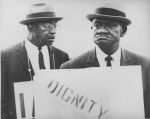Blogs
1968 Memphis Sanitation Workers and Dr. Martin Luther King, Jr.
Thomas Oliver “T.O.” Jones believed a union for sanitation workers in Memphis, Tennessee was a necessity. A sanitation worker himself, he experienced the unfair working conditions and accompanying low pay. It was the 1960s and forty percent of full-time Memphis sanitation workers qualified for welfare assistance. The men had to carry heavy trash bins, often leaking waste, from residents’ yards to the trucks in sweltering Memphis heat. Black workers did not read more »
Now on view: All Labor Has Dignity: The 1968 Memphis Sanitation Workers’ Strike, Photographs by Richard L. Copley
In 1968, Memphis sanitation workers, AFSCME Local 1733, went on strike for increased wages and union recognition, but most importantly, to be treated with respect and dignity. The strike became an important chapter in the civil rights movement, attracting the support of Martin Luther King, Jr., who was visiting the striking workers when he was assassinated. Photographer Richard L. Copley documented key moments read more »
Women Engineers Moved the Midcentury Motor City
 While the number of women in engineering increased dramatically between 1900 and 1950, the actual number of women in engineering was still quite small: approximately 3,000 women, or just two-tenths of one percent of working engineers in the United States. Detroit's automobile industry presented a growing number of opportunities for women in engineering, however, and local papers in the 1950s and 1960s frequently published articles about these female curiosities in what was still very much considered "a man's world." The stories of Society of Women Engineers Detroit Section members provide a fascinating look at the opportunities and challenges faced by midcentury women engineers as they thrived–or not–in the Motor City. read more »
While the number of women in engineering increased dramatically between 1900 and 1950, the actual number of women in engineering was still quite small: approximately 3,000 women, or just two-tenths of one percent of working engineers in the United States. Detroit's automobile industry presented a growing number of opportunities for women in engineering, however, and local papers in the 1950s and 1960s frequently published articles about these female curiosities in what was still very much considered "a man's world." The stories of Society of Women Engineers Detroit Section members provide a fascinating look at the opportunities and challenges faced by midcentury women engineers as they thrived–or not–in the Motor City. read more »
Wayne State and Title IX Panel Discussion - March 22, 11am
Wayne State and Title IX Panel Discussion
Thursday, March 22
11 a.m.
Purdy/Kresge Library Simons Room (144)
Many people think of Title IX as mostly affecting sports but its reach on college campuses goes far beyond athletics. read more »


